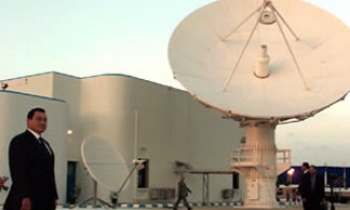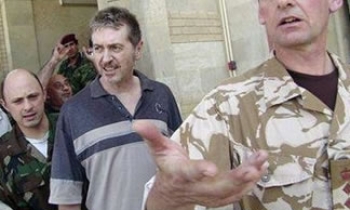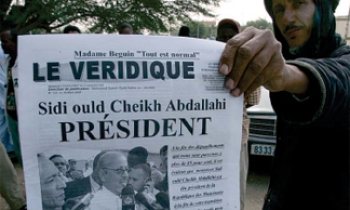A Danish daily's decision to print twelve cartoons featuring Muslim prophet Mohammed could prove costly for Denmark. Experts fear the caricatures could increase the risk of Denmark becoming the target of a terror attack.
The newspaper Jyllands-Posten features in recent propaganda images circulating on the internet. The images show bombs exploding over pictures of the newspaper, and blood flowing over the national flag and a map of Denmark.
Contested caricatures
Jyllands-Posten has been criticised by Muslims for printing the cartoons, and was forced to hire security guards after receiving hate mail and death threats over the telephone.
The newspaper asked illustrators to make the cartoons after reports that artists were reluctant to illustrate a book on Mohammed for fear of Muslim retribution. The daily's editors said the cartoons were a test of whether the threat of Islamic terrorism had limited the freedom of expression in Denmark.
The internet collages, posted in the name of an unknown organisation calling itself 'The Glory Brigades in Northern Europe', showed pictures of various tourist attractions in Denmark and stated that 'The Mujahedeen have numerous targets in Denmark - very soon you all will regret this', amongst other things.
Terror fears heightened
Mehdi Mozaffari, professor of political science at the University of Århus, said this was the first time the acts of private individuals, and not the Danish state, could lead to the country falling prey to a terrorist attack.
'Up until now, the Danish government's presence in Iraq has provoked terror threats. I don't know any previous examples of private acts here in Denmark being linked to threats of terrorist attacks against the public,' Mozaffari said.
Muslim organisations in Denmark, such as the Islamic Religious Community, have demanded an apology, but Editor-in-Chief Carsten Juste rejected the idea. He said the cartoons had been a journalistic project to find out how many cartoonists refrained from drawing the prophet out of fear.
'We live in a democracy,' he said. 'That's why we can use all the journalistic methods we want to. Satire is accepted in this country, and you can make caricatures. Religion shouldn't set any barriers on that sort of expression. This doesn't mean that we wish to insult any Muslims.'
Muslim outrage
Juste's opinion was not shared by Århus imam Raed Hlayhel, who gave an interview to the internet edition of Arabic satellite news channel al-Jazeera to protest the newspaper's cartoons.
Hlayhel told al-Jazeera's reporter that he considered the cartoons derisive of Islam, and described one of the drawings as showing Mohammed wearing a turban-like bomb, and another as brandishing a sabre, with two burka-clad women behind him.
Reports of the cartoons have worried a number of Muslim countries with embassies in Denmark. Earlier this week, they sent a protest to Prime Minister Anders Fogh Rasmussen and the Ministry of Foreign Affairs about the caricatures.
'We are hoping for understanding about Muslims' feelings about Mohammed. And we're hoping for an apology from Jyllands-Posten,' said Mascud Effendy Hutasuhut, minister counsellor at the Indonesian Embassy.
In addition to Indonesia, a number of Arab states, Pakistan, Iran, and Bosnia-Herzegovina have complained about the cartoons, which they see as a hate campaign against Muslims in Denmark.
Fears of al-Queda operations
Fourteen days ago, sources in the Italian intelligence service warned that a Moroccan group with a connection to the al-Queda network had members in Scandinavia.
Søren Hove, terrorism researcher at the Odense University, said the message displayed in the collages was so threatening that it should be investigated by the police. On the other hand, he said, such anonymous threats should be taken with a grain of salt.
'We shouldn't allow this to upset us,' he said. 'Anyone with a minimal knowledge of computers and photoshop can create such internet collages just to raise hell. My guess is that it was someone who lives here, who is angry with Jyllands-Posten, which doesn't mean he has the desire or resources to carry the threats out.'









